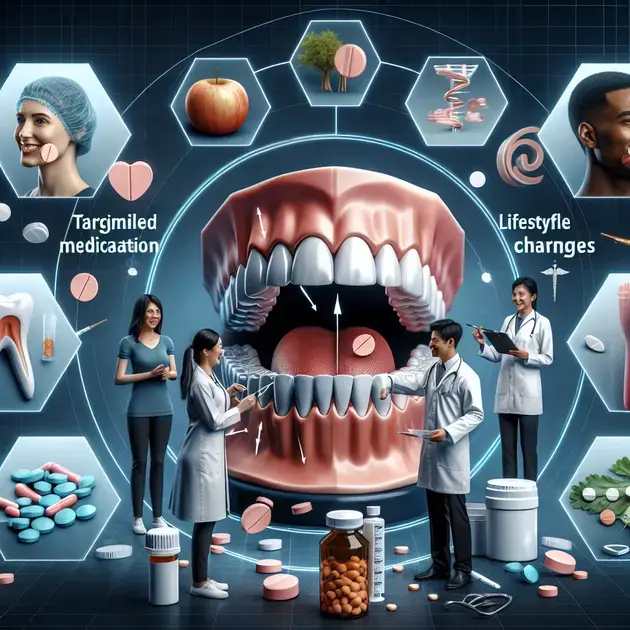When it comes to managing periodontitis, understanding medication options is crucial for effective treatment. Periodontitis, a serious gum infection that damages the soft tissue and destroys the bone that supports your teeth, requires a comprehensive approach for successful management.
Recent studies have shown that incorporating specific medications into the treatment plan can significantly improve outcomes for patients with periodontitis. By understanding the different medication options available, both patients and healthcare providers can work together to develop a personalized treatment strategy that addresses the unique needs of each individual.

Understanding Periodontitis Treatment Options
When it comes to treating periodontitis, there are several options available depending on the severity of the condition. One common method is scaling and root planing, a deep cleaning procedure that removes plaque and tartar from the teeth and root surfaces. This can be done by a dentist or hygienist in a dental office. Another treatment option is the use of antibiotics, either in pill form or as a mouth rinse, to help control the bacterial infection causing periodontitis.
If the condition is more advanced, surgical treatments such as flap surgery or bone grafting may be necessary to restore the health of the gums and supporting bone. These procedures are typically performed by a periodontist, a dentist specializing in gum disease treatment. In some cases, laser therapy or dental implants may also be recommended as part of the treatment plan.
Where to Find Information:
For more detailed information on periodontitis treatment options, you can visit reputable dental websites such as the American Academy of Periodontology (AAP) or the American Dental Association (ADA). These websites provide valuable resources and information on various treatment modalities, including videos and brochures explaining the procedures.
The Role of Medication in Managing Periodontitis
Medication plays a crucial role in managing periodontitis, especially in conjunction with other treatments. Antibiotics are often prescribed to control the bacterial infection and reduce inflammation in the gums. This can help to prevent the progression of the disease and promote healing.
In addition to antibiotics, antimicrobial mouth rinses or gels may be recommended to help control bacteria in hard-to-reach areas. These products are usually available over-the-counter or by prescription from a dentist. Pain relievers or anti-inflammatory drugs may also be prescribed to manage discomfort and swelling during treatment.
Where to Find Information:
To learn more about the medications used in managing periodontitis, you can consult trusted medical websites such as WebMD or the National Institute of Dental and Craniofacial Research (NIDCR). These sites offer in-depth information on various medications prescribed for gum disease and their effectiveness in treatment.
Tailoring Treatment Plans with Medication Options
Each individual with periodontitis may require a customized treatment plan tailored to their specific needs. This plan may include a combination of different medications based on the severity of the disease and the patient’s overall health. The dentist or periodontist will evaluate the patient’s condition and medical history to determine the most effective medication options.
In some cases, a periodontal maintenance program may be recommended to keep the disease under control. This program may include regular dental cleanings, monitoring of gum health, and adjustments to the medication regimen as needed. By working closely with the dental team, patients can ensure that their treatment plan is optimized for long-term success.
Where to Find Information:
For guidance on tailoring treatment plans with medication options, it is advisable to consult with a dental professional. Dentists and periodontists have the expertise to design personalized treatment plans and recommend the most suitable medications for individual cases. Additionally, patient education materials provided by dental offices can offer valuable insights into managing periodontitis with medication.

Sure! Here are the developed subheadings and content for each topic:
The Impact of Lifestyle Changes on Periodontitis Treatment Success
When it comes to achieving success in periodontitis treatment, lifestyle changes play a crucial role in improving overall oral health. One significant lifestyle factor that can impact treatment outcomes is diet. Consuming a diet rich in fruits, vegetables, and lean proteins while avoiding sugary and processed foods can help support the body’s natural ability to fight off gum disease.
Additionally, maintaining good oral hygiene practices, such as regular brushing, flossing, and dental check-ups, is essential for successful periodontitis treatment. These habits can help prevent plaque buildup, which is a leading cause of gum disease.
Another lifestyle change that can positively influence periodontitis treatment success is quitting smoking. Smoking not only weakens the immune system, making it harder for the body to combat infections, but it also hinders the effectiveness of certain periodontal treatments. By quitting smoking, patients can significantly improve their chances of successful treatment outcomes.
Engaging in regular physical activity and managing stress levels are also important lifestyle changes that can contribute to better periodontitis treatment success. Exercise helps boost the immune system and improve circulation, while stress management techniques like mindfulness and relaxation exercises can lower inflammation levels in the body, which is beneficial for gum health.
In conclusion, incorporating positive lifestyle changes, such as a healthy diet, good oral hygiene practices, quitting smoking, regular exercise, and stress management, can significantly impact the success of periodontitis treatment. By addressing these lifestyle factors, patients can improve their overall oral health and enhance the effectiveness of their gum disease treatment.
Maximizing Treatment Efficacy with Probiotics in Periodontitis Management
Probiotics have emerged as a promising approach in enhancing the efficacy of periodontitis treatment. These beneficial bacteria can help rebalance the oral microbiome, promoting a healthier environment in the mouth and supporting the body’s natural defense mechanisms against gum disease.
Studies have shown that specific strains of probiotics, such as Lactobacillus reuteri and Bifidobacterium lactis, can inhibit the growth of harmful bacteria associated with periodontitis, reducing inflammation and improving gum health.
By incorporating probiotics into a comprehensive periodontitis management plan, patients can potentially enhance the effectiveness of traditional treatments, such as scaling and root planing. Probiotics can help maintain a healthy bacterial balance in the mouth, preventing the overgrowth of pathogenic bacteria that contribute to gum disease.
Furthermore, probiotics can also support the body’s immune response, helping to regulate inflammation and promote tissue healing in the gums. This can lead to improved treatment outcomes and a reduced risk of disease recurrence in patients undergoing periodontitis therapy.
In summary, the use of probiotics in periodontitis management holds great promise in maximizing treatment efficacy. By incorporating these beneficial bacteria into a comprehensive treatment plan, patients can potentially improve their gum health, enhance the effects of traditional therapies, and support long-term oral wellness.
Personalizing Periodontitis Treatment with Targeted Medication Approaches
Personalizing periodontitis treatment through targeted medication approaches is a cutting-edge strategy that aims to optimize treatment outcomes for individual patients. By tailoring medications to each patient’s specific needs and response to therapy, healthcare providers can deliver more effective and personalized care for gum disease.
One targeted medication approach involves the use of antimicrobial agents, such as chlorhexidine mouthwash or local antibiotic delivery systems, to directly target and eliminate pathogenic bacteria in periodontal pockets. These targeted medications can help reduce inflammation, control infection, and promote healing in the gums.
Another personalized treatment approach is the use of host modulation therapy, which involves medications that target the body’s immune response to gum disease. By regulating the inflammatory response and promoting tissue regeneration, these medications can enhance the effectiveness of periodontitis treatment and support long-term gum health.
Furthermore, advancements in genetic testing and personalized medicine have allowed healthcare providers to identify specific genetic factors that may influence an individual’s response to periodontitis treatment. By utilizing genetic information, clinicians can tailor medication therapies to target genetic markers associated with gum disease susceptibility and treatment outcomes.
In conclusion, personalizing periodontitis treatment with targeted medication approaches represents a promising frontier in gum disease therapy. By customizing medications to each patient’s unique needs and biological profile, healthcare providers can optimize treatment efficacy, enhance patient outcomes, and revolutionize the approach to managing periodontal health.
Conclusion
In conclusion, lifestyle changes are pivotal in the success of periodontitis treatment. A healthy diet rich in fruits, vegetables, and lean proteins, coupled with good oral hygiene practices like regular brushing and flossing, can significantly bolster the body’s natural defenses against gum disease. Quitting smoking, engaging in physical activity, and managing stress levels further enhance treatment outcomes, underscoring the importance of a holistic approach.
Moreover, probiotics offer a promising avenue for maximizing periodontitis treatment efficacy. By rebalancing the oral microbiome and inhibiting harmful bacteria growth, specific probiotic strains like Lactobacillus reuteri and Bifidobacterium lactis can reduce inflammation, improve gum health, and complement traditional therapies such as scaling and root planing. The immune-modulating properties of probiotics also support tissue healing, reducing the risk of disease recurrence.
Additionally, personalized medication approaches herald a new era in periodontitis management. Tailoring antimicrobial agents and host modulation therapies to individual needs and genetic factors can optimize treatment outcomes, control infections, and promote tissue regeneration. By leveraging advancements in genetic testing and personalized medicine, healthcare providers can deliver more effective, targeted care, revolutionizing the management of periodontal health.



